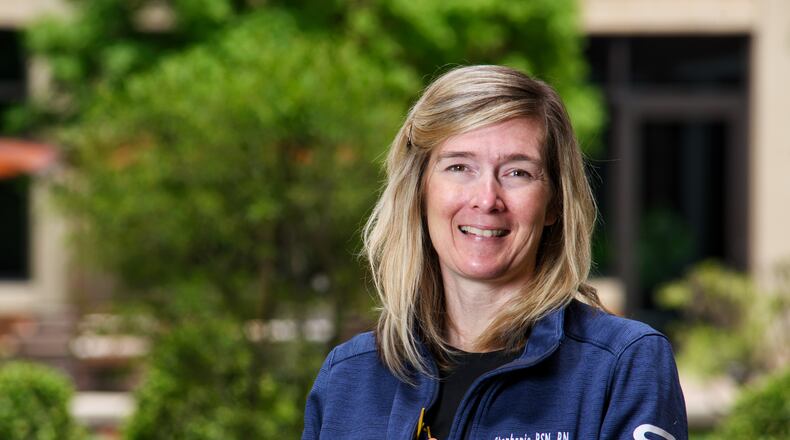Not a big deal, right?
But when she came out of surgery, her husband, Jim, uttered three words.
“You have cancer.”
“I didn’t understand,” Little explained.
“You have cancer.”
She was diagnosed with Stage 4A stomach cancer, and the prognosis was six months to two years. This for a 45-year-old endurance athlete, strict follower of a healthy diet and exercise program and mother of three.
“Hard to swallow,” she said of the dire diagnosis.
That was in early November 2020, and in the six months since, Little has endured several chemotherapy treatments, returned to work, gained a new perspective on life and changed the way she approaches patient care.
This is Nurses Week, and there’s no better time to celebrate their tireless work.
Being a cancer patient has given her a new insight into what her COVID-19 patients and their families were facing because she was facing it as well, especially lack of visitors.
Early last year, when the coronavirus pandemic arrived, the medical profession was turned upside down. When elective surgeries were halted by the state, Little became a leader in AMC’s High Risk Respiratory Unit, or “the COVID Unit.” There were times when Little, a nurse with more than 20 years of experience, felt like she was a rookie.
Everything about her job seemed to be different on the COVID Unit from how lab work was processed to how patients’ conditions were checked with baby monitors in their rooms to how trash bags were emptied, tied and disposed.
“Completely foreign environment and equipment,” she said. “We were learning from the ground up and on the fly.”
Those who had never cared for someone with COVID-19 suddenly found themselves in the eye of the global pandemic. Hospital policies seemed to change daily. Doctors met with their patients and their families virtually.
“That was a huge challenge,” she said. “We were caring for very, very sick patients. I told the nurses to take pictures and keep a journal because this will never happen again, hopefully.”
During her surgery, one-third of her stomach and three inches of intestines were removed to ensure the cancer hadn’t spread. The surgeon removed 26 lymph nodes. One week later, the pathology report confirmed she had cancer.
She remembers sitting in the hospital alone waiting for scan results when she looked down the hall and saw a patient, with tubes and wires everywhere, being pushed on a cart by a “ragged and tired” nurse.
Tears filled her eyes as Little explained there was a time when she thought her medical career was over.
“I have never wanted to be that nurse more,” she said. “I would have told her, ‘I wish I was in your shoes right now.’”
Little has one more chemotherapy treatment, then if her scans every three months remain clean, she will go on oral chemotherapy treatments.
She was told “live for every three months. You are living until the next PET scan.”
When asked what lessons we can take from her journey, Little said: “You should never underestimate what you can do professionally or personally. You can always do more than you think you can.”
Even while fighting the coronavirus and cancer.
About the Author

